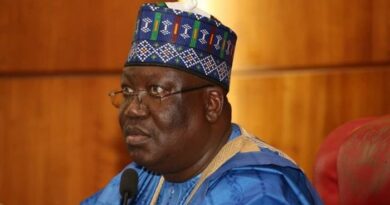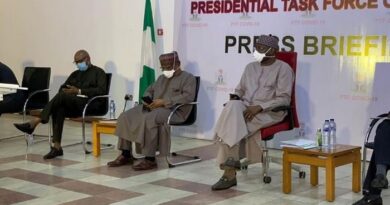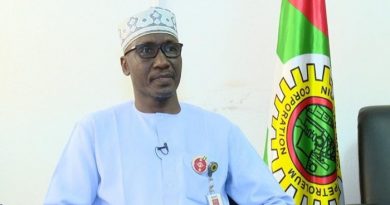We must win back our best brains, VP Osinbajo says at UCH 60th anniversary
*FG to upgrade teaching hospital in Ibadan, 8 other tertiary healthcare centers
*”In the last 60 years, UCH has also produced some of the most accomplished and most distinguished medical personnel the world has seen.” – Vice President
Remarks by the Vice President, Federal Republic Of Nigeria, His Excellency, Prof. Yemi Osinbajo, SAN, at the 60TH anniversary of the University College Hospital, Ibadan, Oyo State, on November 20, 2017
Protocol
It is a special pleasure to be here to celebrate the 60th anniversary of the leading tertiary health facility in Nigeria. The management and workers at University College Hospital, Ibadan, have every cause to celebrate this milestone.
“Oritamefa”, as UCH is fondly called, has attained the status of legend, pioneering complex health procedures in Nigeria, and spearheading landmark medical research of global relevance.
From the beginning, the vision, according to the 1952 broadcast of Sir Sydney Phillipson, CMG, was to build a “consultant medical centre for the whole country”, from which “will go out highly qualified doctors for service throughout Nigeria.”
In August 1952, the Federal House of Representatives sitting in Lagos passed ‘the UCH Ordinance’ which established a University College Hospital for the University College, Ibadan (now University of Ibadan). Construction started in 1954, and, on this day 60 years ago, the University College Hospital, Ibadan, was commissioned for use.
In the last 60 years, UCH has also produced some of the most accomplished and most distinguished medical personnel the world has seen.
Let me specially recognize the first Nigerian medical doctor to be employed in the University College Hospital, and who went on to become the first Emeritus Professor of Medicine of the University of Ibadan, and the first Nigerian in history to obtain the Membership of the Royal College of Physicians of England, our own Emeritus Prof. Theophilus Ogunlesi, the UCH 60th anniversary lecturer. In the early 1960s, Emeritus Professor Ogunlesi founded the world-renowned Ibarapa Community Health Project, to incorporate local content into the London-oriented curriculum of the University of Ibadan.
Since those early days, UCH has gone on to open new frontiers in health care service delivery. It was the first medical institution in Nigeria to launch Nuclear Medicine services, the first to introduce Palliative and Hospice Care services for end-of-life and chronic debilitating diseases, and the first to open a Geriatric Centre in Africa – the Chief Tony Anenih Geriatric Centre, which began operations in 2012, and today, we’ve just commissioned the Adebutu Geriatric Rehabilitation Centre.
UCH is also responsible for pioneering interventions in heart and brain surgery in Nigeria, as well as the development of the award-winning Bladder Manikin, which has been patented for use as a medical teaching-aid in low-income countries.
However we must acknowledge that the last few decades have not exactly been a stellar period for healthcare in Nigeria; marked by the same tragic malaise of underfunding, neglect and corruption that have left no aspect of our national life untouched. Medical workers know more than the rest of us that, without acknowledging and diagnosing a condition, it would be difficult, if not impossible, to prescribe and implement the appropriate solutions.
The sad state of affairs in our healthcare system has led to dismal levels of professional satisfaction amongst our medical personnel, and is at the root of the alarming brain drain that has depopulated institutions like this. While this should never have happened in the first place, we now have an incredible opportunity to fight hard to win back our best brains, and to give emerging generations of our medical personnel a new reason to believe in their country and its possibilities.
But first we must create the right conditions at home, by investing in infrastructure, and vigorously fighting the corruption that underlies much of the decline and rot. We must also as a matter of urgency redefine our approach to healthcare delivery, management of healthcare institutions and enabling the private sector a prominent place in our healthcare delivery.
As for the Federal Government, we made our health policy clear: we want to offer affordable, accessible and qualitative healthcare to all Nigerians and others irrespective of social status and location. At the heart of this vision is our goal of providing basic healthcare to all Nigerians, as this will cater to over 70 percent of healthcare needs. Our Primary Healthcare Revitalization Programme was personally flagged off by Mr. President at Kuchigoro, a suburb of Abuja, last year.
UCH is an important part of the narrative; complementing this initiative through its Rural Comprehensive Health Centres located at Sepeteri in Oyo State and Okuku in Osun state.
In addition, UCH’s four federally-funded Schools – responsible for training Primary Health Care Tutors, Community Health Officers Tutors, Nurse/Midwifery Tutors and Environmental Health Officers Tutors have been meeting Nigeria’s manpower training needs for decades now; and graduates from these institutions constitute the backbone of Primary Health Care and Comprehensive Health Care delivery in Nigeria.
I am also pleased to note that UCH is one of the initial eight tertiary health facilities that the Buhari administration will be upgrading, through the investment of the Nigerian Sovereign Investment Authority (NSIA).
Your Excellencies, Faculty and Staff of the UCH, it is on the present leadership of this great institution that the burden of attaining the vision so inspiringly set six decades ago now lies.
But that task will require a paradigm shift in our thinking about funding and management. It is clearer by the day that Government alone cannot adequately fund most of its infrastructure commitments.
For the first time in almost two decades we are spending as much as 30% of our budget on infrastructure. Our 2016 capital spend of about N1.3 trillion is the highest in the nation’s history. Yet we are still a long way from adequately dealing with the massive infrastructure deficit. We have to seek greater private sector funding.
A well-resourced endowment programme is one. It is gratifying to see that as part of these 60th anniversary celebrations, UCH is also launching an endowment fund. The challenge is in ensuring that management and administration of the fund is resourced with the capacity to aggressively and creatively grow the endowment. Aside from philanthropy, there are important linkages that must be established with commerce and industry that may encourage the private sector to actively support the clinical, research and teaching functions of the Hospital.
Collaboration is the tested strategy for the future. Fortunately UCH itself has a long history of being involved in game-changing collaborations; more than 50 years ago, the Ibarapa Community Programme was the joint effort of the University of Ibadan, the Government of the Western Region, the Rockefeller Foundation, the Liverpool School of Tropical Medicine, the London School of Tropical Medicine and Hygiene, and the Ibarapa community. We must now create similar partnerships, locally and internationally.
It is now clearer than ever before that the private sector is the key to settling the institution’s funding needs. The discipline of justifying funds given by the private sector will be important in the prudent and effective use of funds. I commend the management of the hospital for adopting Public Private Partnership initiatives in many areas of service delivery. Our ultimate funding plan is the comprehensive retooling of the NHIS. We fully appreciate that there is no way of effectively funding healthcare for a nation that will have the fourth largest population in the world by 2050 without a fully operational National Health Insurance Scheme.
As we commemorate the 60th anniversary of this distinguished institution, I would like us to take a moment to look into the future, to create in our minds a picture of what we would like the next 60 years of UCH to look like. I was excited to hear Prof. Emeritus Ogunlesi project to a UCH 40 years hence. But let us, today, begin with what the next decade must look like. UCH will undoubtedly be a global centre of excellence, staffed by highly motivated personnel, producing cutting-edge and commercially viable research that helps to underwrite a large chunk of its funding needs.
That picture of UCH 2027 must necessarily incorporate the emerging technologies that are already defining every aspect of human existence: artificial intelligence, robotics, data science, and the Internet of things. There is a strong possibility that the UCH of 2027 will require on its payroll as many software engineers as medical personnel.
The sophistication that will be required to run hospitals then will compel us to exit the approach of burdening academics with hospital management which, as we know, is really a distinct professional discipline. In this exciting new future, real time partnerships with centres of excellence around the globe will be crucial, and so investment in broadband infrastructure will be a massive game changer. That future is already here.
Finally, may I once again congratulate the management and staff of University College Hospital on this milestone commemoration, and join you all in looking forward to an even greater sixty years ahead. I thank you for listening.
God bless the University College Hospital, Ibadan, and God bless the Federal Republic of Nigeria.




